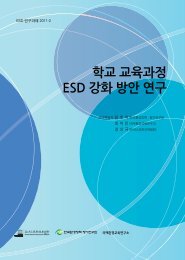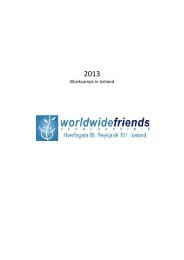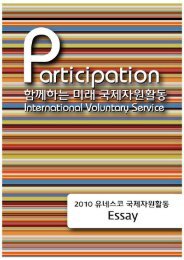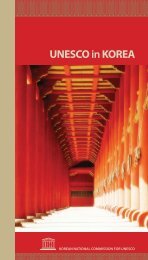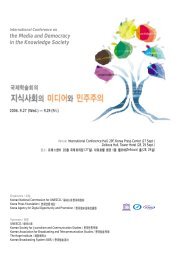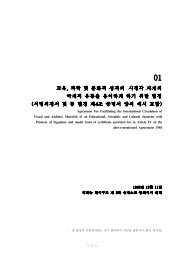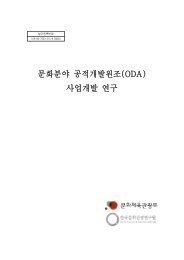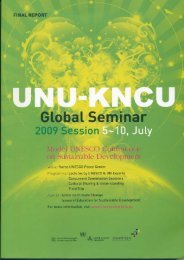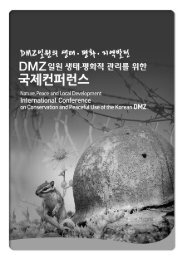íëìë³´ë2012문íì ë°ì ë¼ì´ëí ì´ë¸.pdf - ì ë¤ì¤ì½íêµììí
íëìë³´ë2012문íì ë°ì ë¼ì´ëí ì´ë¸.pdf - ì ë¤ì¤ì½íêµììí
íëìë³´ë2012문íì ë°ì ë¼ì´ëí ì´ë¸.pdf - ì ë¤ì¤ì½íêµììí
Create successful ePaper yourself
Turn your PDF publications into a flip-book with our unique Google optimized e-Paper software.
UNESCO also provides a unique platform for international cooperation, technical and<br />
financial assistance, as well as for fostering dialogue, mutual respect, appreciation and<br />
understanding.<br />
However, while UNESCO has a specific mandate, we believe that “Culture” is not a<br />
“UNESCO-specific” concern. Indeed, 18 UN organizations work in this area thereby<br />
illustrating both the transversality and the intrinsic importance of culture in the field (UNDP,<br />
UNIDO, UNWTO, IFAD, WIPO, FAO, UNEP, UNCTAD, UNITAR, UNOPS, UNAIDS,<br />
UNHCR, UN-Habitat, UNFPA, UNV)<br />
It is therefore rather interesting, that while culture was not explicitly recognized in year<br />
2000 in the international development agenda, the UN System as a whole has gradually<br />
become more and more involved in integrating culture, or following a culture-sensitive<br />
approach in their development work.<br />
As Professor Throsby indicated, the international community is falling short on delivering<br />
on the targets set out in the Millennium Development Goals in 2000. As we approach 2015,<br />
we are all looking forward, working to see how we can promote socioeconomic and human<br />
development across the globe. For UNESCO, the answer is inextricably linked to the<br />
approach that culture both enables and drives development, and for this reason, it is important<br />
that it be recognized as such in the international development agenda moving forward. In<br />
short, Culture cannot be sidelined in the post 2015 agenda.<br />
What do we mean by saying that culture both enables and drives development?<br />
Our argument is based on three main axes:<br />
Culture has a transformative power that can help broaden the development<br />
debate.<br />
A human-centred approach to development that emerges the cultural context<br />
is most likely to be effective and to yield sustainable, inclusive and equitable<br />
outcomes.<br />
Culture is a resource to:<br />
Simultaneously address both the economic and human rights dimensions<br />
of poverty and<br />
Provide innovative solutions to complex development issues, such as gender,<br />
health and environment and challenges in the areas of education and livelihoods.<br />
UNESCO has embarked upon a coordinated strategy in order to promote this vision. We<br />
have been moving on two levels: the international, institutional policy level, and of<br />
course, at the national, country level – where it really counts and where we can see in situ,



